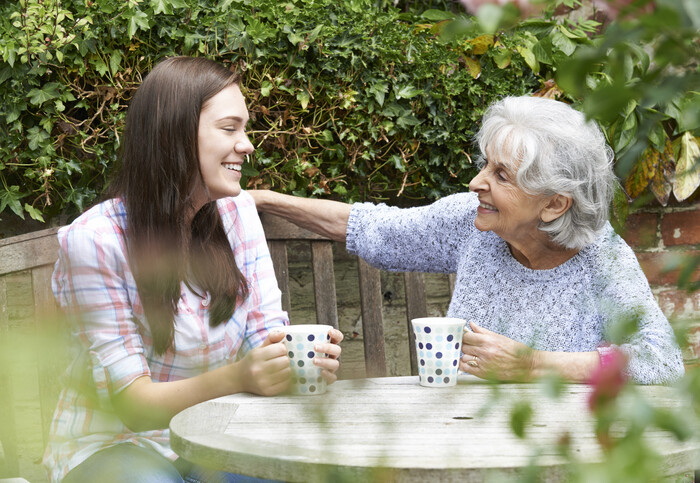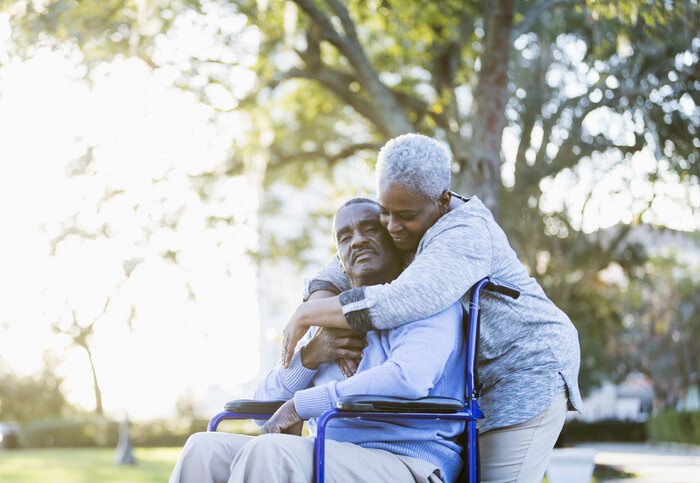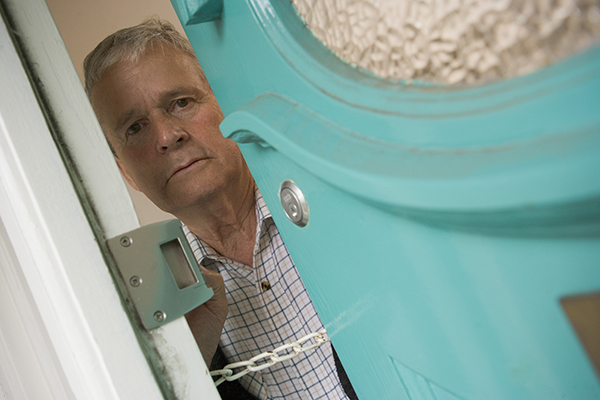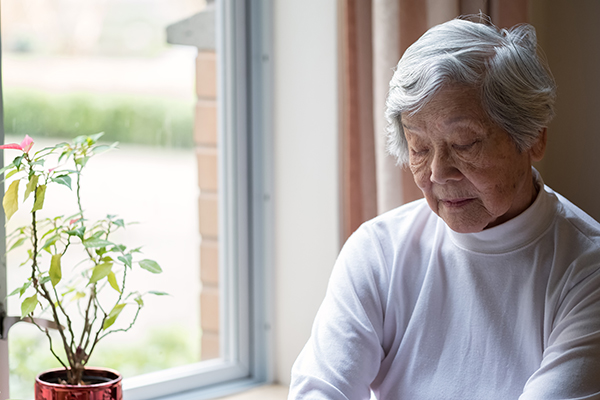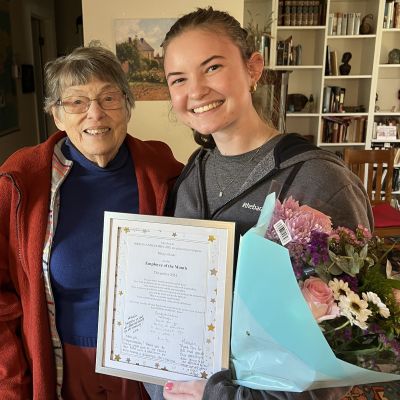Senior Loneliness
The Alarming Link Between Isolation and Alzheimer’s Progression
An attractive mature African American woman asks a question by raising her hand in class.
In the past several years since COVID-19 became a household term, seniors, who are most vulnerable to severe complications from the virus, became more isolated in order to stay safe. And while we already were aware that there are health risks connected with loneliness and isolation, we’re now beginning to realize another serious concern: how isolation and Alzheimer’s progression are linked.
Since people with Alzheimer’s and other forms of dementia may struggle to understand and follow safety precautions, like wearing face coverings, reporting symptoms, and social distancing, isolation for these individuals became especially critical. But while maintaining these seniors’ physical health was the top priority, it’s also important to pay attention to their emotional wellbeing, which can also be negatively impacted without sufficient … Read More »
Tips on How to Help Someone With Alzheimer’s Through Reminiscence Therapy
Discover how to help someone with Alzheimer’s in a simple and unique way: reminiscence therapy.
Did you ever experience that jolt of a past memory that immediately pops to the front of your mind, perhaps through a scent, a song, or a picture? For those with dementia, the power of long-term memories is especially impactful, as short-term memory becomes weaker. And if you’re looking for ideas on how to help someone with Alzheimer’s, tapping into this idea is a great place to start. In fact, it’s become a growing trend in creative Alzheimer’s care: reminiscence therapy.
One extreme example is the transformation of a 9,000-sqft building in Chula Vista, California. The building is now an interactive 1950s town, including storefronts like a diner, a movie theater, and a healthcare clinic, all operating just as they would have been … Read More »
Overcome Senior Isolation and Loneliness with These Tips
We know that socialization is vitally important for our overall emotional (and even physical) wellbeing – but we also know that senior isolation and loneliness is an epidemic in America. With the hectic pace of life, it’s difficult for families and friends to provide the full measure of social interaction needed to keep loneliness at bay for older adults, who are often homebound or unable to get out as much as they’d like.
But the mother of invention truly is necessity, and the need for creative socialization solutions has sparked some interesting innovations:
The Chat Bench
Thanks to the police department in the southwest England town of Burnham-On-Sea, several benches now boast signage that boldly proclaims, “The Happy to Chat Bench: Sit Here if You Don’t Mind Someone Stopping to Say Hello.” And, stop they do! It’s a lovely … Read More »
Women and Alzheimer’s: Why the Risk Is So Much Greater and How to Help
Understand the trend between women and Alzheimer’s and discover how you can help someone you love who is battling the disease.
Researchers are finally beginning to get a grip on the imbalance between Alzheimer’s diagnoses in women and men. Currently, as many as 2/3 of those with Alzheimer’s in the U.S. are female. As scientists begin to understand the particular nuances behind the increasing trend of women and Alzheimer’s, we can begin to address the problem and find solutions.
According to the Alzheimer’s Association’s Director of Scientific Engagement, Rebecca Edelmayer, “Women are at the epicenter of Alzheimer’s disease as both persons living with the disease and as caregivers of those with dementia. Over the last three years, the Alzheimer’s Association has invested $3.2 million into 14 projects looking at sex differences for the disease and some of the … Read More »
End-of-Life Care Tip: Participating in Tough Conversations
When providing end-of-life care, one of the best gifts you can offer is a listening ear.
Sharing what’s on our hearts with those we love is never more important than when someone is nearing the end of life. There are often unspoken sentiments and unresolved issues that, once verbalized, can bring peace and a deeper connection with our loved ones in their final days.
As Dr. Jessica Zitter, physician in critical and palliative care medicine at Highland Hospital in Oakland, CA explains, “Those are opportunities for people to take stock and say, ‘I want to be more intentional about how I want to relate to people in my life.’ Death should really be seen as the last opportunity that you have to make amends and clean things up before you’re in the next world, wherever that may be.”
Read More »
4 Ways to Promote Purpose and Meaning for Seniors
Promote purpose and meaning for the seniors in your life with these ideas.
Think of a typical day in the life of a senior loved one. Hopefully it provides several positive and enriching experiences: enjoying breakfast, engaging in a fun hobby or interest, visiting with a friend or family member, watching a favorite TV show. Nevertheless, there’s a difference between positivity and purpose and meaning for seniors; and the need for a life rich with significance and purpose is starting to become more evident, particularly in the life of aging parents.
Viktor Frankl , world-renowned psychiatrist and survivor of the Holocaust, shares poignantly, “What matters is not the meaning in life in general, but rather the specific meaning of a person’s life at a given moment.”
For people whose identity has been focused on a career and raising … Read More »
Wandering in Dementia: Why It’s Happening and How to Help
Wandering in dementia is one of the most difficult effects to manage, and safety is a top concern.
Of all the impacts of Alzheimer’s disease, one of the most alarming is the individual’s tendency for wandering and the potential dangers that may develop if the senior becomes confused or lost. Wandering in dementia can occur any time the older adult is:
Scared, confused, or overwhelmed
Trying to find someone or something
Bored
Trying to maintain a familiar past routine (such as going to work or shopping)
Tending to a simple need (such as searching for a drink of water or going to the bathroom)
The aim is twofold; to help keep your loved one secure, and also to be certain that his/her needs are satisfied to attempt to stop the want to wander to begin with. Consider the following safety measures if your … Read More »
How to Help Someone with Parkinson’s from a Distance
If you’re wondering how to help someone with Parkinson’s disease when you live out of the area, we have four suggestions for you.
The days when extended families lived together on neighboring plots of land are, unfortunately, a thing of the past in many cases. With loved ones spread apart, it’s not always possible to provide the caring, hands-on care and support that older family members often need, especially when a chronic health condition – like Parkinson’s disease – creates additional concerns.
Yet even from a distance, there are still plenty of ways to assist. The Michael J. Fox Foundation offers these tips on how to help someone with Parkinson’s from afar:
Get organized. Take and keep detailed notes about medications being taken, treatments, emergency contacts, and other aspects of the person’s care needs. A digital version of this … Read More »
How to Find Joy Despite Living with Pain or Chronic Illness
Even while living with pain or chronic illness, it is possible to live a full and joyful life.
Have you ever woken up and said, “It’s definitely going to be one of those days!” Maybe your alarm didn’t go off, the hot water heater decided to stop working, and the dog chewed up one of your favorite shoes overnight. Now consider if each day were “one of those days!” For someone living with pain or chronic illness (and that is the majority of the older adult population), routine struggles and challenges may be a given.
However, there are several steps that the elderly can take to discover and maintain a life of joy, even in the face of chronic illness. For instance:
Follow passions. Discovering purpose and meaning in every day is essential – and achievable. Many older adults … Read More »
The Dangers of Senior Loneliness – and How to Help
With over 328 million people residing in the U.S. alone, it is hard to believe that senior loneliness would be so prevalent. And yet of the number of older adults living alone, more than 60% of them report being chronically lonely.




